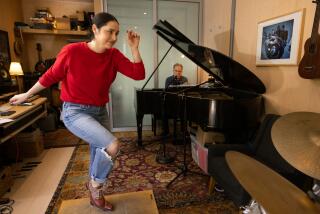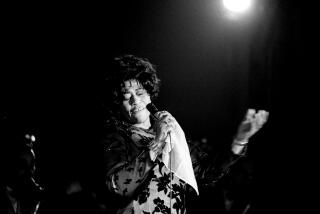Chick Corea and Gary Burton continue their musical conversation
- Share via
When other musicians said no, Chick Corea and Gary Burton said yes. That simple affirmation sparked one of jazz’s most celebrated collaborations, an improvisation-laced duo uncommon in its popularity, longevity and creative output.
They played their first duet together at a 1972 Munich jazz festival programmed as a series of solo recitals. The event’s producer figured the musicians would be willing to team for a rousing impromptu finale, but all the other players bowed out, leaving only Corea on piano and Burton on vibraphone.
“Most of us don’t like jam session situations,” says Burton, 68, who performs with Corea this week in Costa Mesa and at UCLA. “You’re in front of an important audience, you want to do your own thing. But in this case the promoter seemed desperate. Chick taught me ‘La Fiesta’ at the sound check, a new tune he had just written. It wasn’t that we were so sensational, but it was different, and it really got the audience on their feet.”
Manfred Eicher, founder of the fledgling German label ECM, was in attendance and realized the duo had big potential. Corea and Burton were skeptical, unconvinced that the stripped-down combo could hold an audience’s attention for the length of an album, let alone an entire concert.
Several months later, however, Eicher had them booked for three days in an Oslo studio. Within three hours, they had recorded all the material for “Crystal Silence,” a ravishing album marked by their exquisite dynamic calibration and quicksilver empathic interplay.
“When Manfred suggested that we should record, we said, ‘Come on, who wants to listen to an hour of vibes and piano without a rhythm section?’” Burton recalls. “We figured it would be one of those artist projects you love but no one notices.”
Critics, fans and their fellow musicians took note. “Crystal Silence” confirmed Corea’s status as one of jazz’s most impressive composers, with definitive versions of his standards “Señor Mouse,” “Children’s Song” and “What Game Shall We Play Today.”
The album quickly became a beloved classic that helped open new frontiers for duos and chamber jazz, but Corea and Burton didn’t record a follow-up until 1979’s “Duet” and 1980’s double album “In Concert,” both Grammy winners for best group instrumental jazz performance.
They revisited their pairing in 1997 with “Native Sense” (Stretch) and again in 2008 with “The New Crystal Silence” (Concord Records), a double album featuring one disc of duets and another with the Sydney Symphony. If the past served as a guide, a new duo album wouldn’t be due until at least 2018, but Corea has never been noted for his predictability.
They booked the Southern California dates in preparation for a new album they plan to record next month at Corea’s home studio in Clearwater, Fla. Rather than focusing on the pianist’s tunes, they’ll be exploring a disparate array of material, including pieces by Kurt Weill, Antonio Carlos Jobim, Dave Brubeck and the Beatles.
“It’s the kind of musical situation I enjoy the most, working with a musician friend whose playing I really love, who I always feel like I can learn something from,” says Corea, 69. “People talk about the difficulty of blending the instruments, but I’ve never found that. The term ‘blend’ really should be understood in a spiritual sense, not just a physical sense. It’s two musicians communicating together.”
Burton and Corea have pursued a multiplicity of musical directions since gaining national attention in the early 1960s, but the pianist has set a daunting standard when it comes to radical sonic shifts. He was at the center of Miles Davis’ early fusion experiments, playing various electric keyboards on several seminal albums between 1968- and 1970, including “In a Silent Way” and “Bitches Brew.” But Corea took a sudden left turn when he and bassist Dave Holland quit the trumpeter’s band to form the acoustic free-jazz quartet Circle.
Next Corea delved into straight-ahead jazz with Stan Getz and then launched a Brazilian jazz-rock combo featuring Airto and Flora Purim, Return to Forever, which soon morphed into a blazing fusion band that turned Corea into a rock star.
Through all Corea’s overlapping incarnations, he’s kept the duo as his sole constant, performing at least several times every year since that day in Munich. For both men, it’s a singular partnership, with each performance expanding on their dialogue, which is witty, playful and emotionally receptive.
“If you think in terms of speaking, a solo performance is like a speech,” Burton says. “If you play with a band, it’s like a panel discussion. But a duet with Chick is an intense conversation with your best friend. You know what he’s going to say before they say it, so you can jump ahead. There are a lot of sparks flying, and you feel free to pursue any thought or feeling.”
More to Read
The biggest entertainment stories
Get our big stories about Hollywood, film, television, music, arts, culture and more right in your inbox as soon as they publish.
You may occasionally receive promotional content from the Los Angeles Times.










